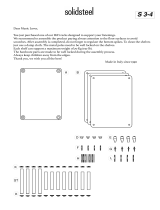
10
WARNING
To avoid electric shock, which can cause
death or severe personal injury, disconnect
the refrigerator from electrical power before
connecting a water supply line to the
refrigerator.
NOTE
Check with your local building authority
for recommendations on water lines and
associated materials prior to installing
your new refrigerator. Depending on
your local/state building codes, Frigidaire
recommends for homes with existing
valves its Smart Choice
®
water line kit
5304490728 (with a 6 ft. Stainless Steel
Water Line) or 5304493869 (with a 6
ft. Polyline Water Line) and for homes
without an existing valve, Frigidaire
recommends its Smart Choice
®
water
line kit 5304490717 (with a 20 ft. copper
water line with self-tapping saddle valve).
Please refer to www.frigidaire.com/store
for more information.
CAUTION
To Avoid Property Damage:
• Copper or Stainless Steel braided tubing
is recommended for the water supply
line. Water supply tubing made of ¼
inch plastic is not recommended to be
used. Plastic tubing greatly increases
the potential for water leaks, and the
manufacturer will not be responsible for
any damage if plastic tubing is used for
the supply line.
• DO NOT install water supply tubing in
areas where temperatures fall below
freezing.
• Chemicals from a malfunctioning softener
can damage the ice maker. If the ice
maker is connected to soft water, ensure
that the softener is maintained and
working properly.
IMPORTANT
Ensure that your water supply line
connections comply with all local plumbing
codes.
CONNECTING THE WATER SUPPLY
Before Installing The Water Supply Line,
You Will Need:
• BasicTools:adjustablewrench,at-blade
screwdriver, and Phillips
TM
screwdriver
• Access to a household cold water line with
water pressure between 30 and 100 psi.
• A water supply line made of ¼ inch
(6.4 mm) OD, copper or stainless steel
tubing. To determine the length of tubing
needed, measure the distance from the
ice maker inlet valve at the back of the
refrigerator to your cold water pipe. Then
add approximately 7 feet (2.1 meters),
so the refrigerator can be moved out for
cleaning (as shown).
To Connect Water Supply Line To Ice
Maker Inlet Valve
1 Disconnect refrigerator from electric
power source.
2 Place end of water supply line into sink or
bucket.TurnONwatersupplyandush
supply line until water is clear. Turn OFF
water supply at shutoff valve.
3 Remove plastic cap from water valve inlet
and discard cap.
4 If you use copper tubing - Slide brass
compression nut, then ferrule (sleeve)
onto water supply line. Push water supply
line into water valve inlet as far as it
will go (¼ inch/6.4 mm). Slide ferrule
(sleeve)intovalveinletandngertighten
compression nut onto valve. Tighten
another half turn with a wrench; DO NOT
over tighten. See Figure 1.
If you use braided exible stainless
steel or polyline tubing - The nut is
already assembled on the tubing. Slide
nutontovalveinletandngertighten
nut onto valve. Tighten another half turn
with a wrench; DO NOT over tighten. See
Figure 2.
• A shutoff valve to connect the water supply
line to your household water system. Do not
use a self-piercing type shutoff valve.
• Donotre-usecompressionttingoruse
thread seal tape.
• A compression nut and ferrule (sleeve) for
connecting a copper water supply line to the
ice maker inlet valve.




















